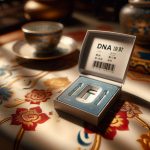LifeNome, a leading company in the realm of Precision Health AI, is making waves by tailoring health solutions to individual needs. At its core, the firm integrates a variety of data points such as biological, physiological, and behavioral information to create highly personalized health assessments and interventions. This approach finds its application across multiple domains including wellness, nutrition, fitness, insurance, and personal care sectors.
In an enlightening conversation, CEO Ali Mostashari sheds light on the transformative power of precision medicine. He champions the cause for a future where healthcare moves from being reactive to preventive. His visionary perspective underscores not just an evolution but a revolution in how we perceive and manage health and wellness. According to Mostashari, this shift towards prevention will redefine our relationship with healthcare services by making them more attuned to our unique profiles.
The benefits that LifeNome promises through its innovative approach are vast. By focusing on precision medicine—essentially customizing healthcare using detailed insights into individual genetic makeup—it aims at enhancing effectiveness while minimizing risks associated with one-size-fits-all treatments. Such methodologies have profound implications for individuals seeking tailored nutrition guides or fitness plans that harmonize with their specific bodily requirements.
Ali Mostashari’s pioneering thoughts invite us to envision a future where each person’s healthcare journey is as unique as their DNA—a future where predictive analytics can preemptively guide our wellness paths before ailments manifest physically. It’s clear that LifeNome‘s mission aligns perfectly with this forward-thinking model; spearheading efforts toward a healthier tomorrow shaped by science-driven personalization.
Company Origins: The Inspiration and Growth Journey
With a strong foundation in science and research, the team behind LifeNome is pioneering the field of Precision Health. Led by highly esteemed individuals with Ph.D.s from notable institutions like MIT and the Weizmann Institute, their collective work has amassed over 200,000 citations. This depth of knowledge positions them as leaders in their respective fields, including complexity science, translational bioinformatics, and semantic networks.
LifeNome‘s mission is to help people make informed decisions about their health before they find themselves facing medical issues. Unlike precision medicine that addresses treatment after diagnosis, Precision Health focuses on proactive measures. It’s all about understanding what can be done now to prevent illness later on. The approach involves analyzing various data layers from an individual’s life to foresee potential health risks.
A unique aspect of LifeNome‘s strategy is its reliance on biological data such as DNA or microbiome information and may expand into RNA or proteomics analysis based on future economic feasibility. Additionally, physiological metrics collected from wearable technology—like smartwatches or glucose monitors—are taken into account alongside lifestyle, environmental influences, and cultural preferences.
Understanding that personal beliefs play a significant role in acceptance and adherence to health advice; customization becomes key. For instance, dietary recommendations need to respect religious restrictions without compromising nutritional value.
Leveraging artificial intelligence (AI), LifeNome doesn’t just look at data linearly but examines how various risk factors could combine to affect traits uniquely present in each individual. This comprehensive analysis allows for tailored recommendations spanning nutrition, fitness routines, stress management strategies among others — even extending into skincare regimens suited for one’s genetic makeup.
Beyond serving individuals aiming for better health outcomes, LifeNome also operates as a B2B entity offering analytics platforms for businesses within insurance healthcare biotech pharma consumer sectors including partnerships with giants like Pepsi Unilever Its global footprint spans New York City Europe Asia ensuring vast reach influence across different markets industries.
What is the purpose of gathering data, and what goals do you aim to accomplish with it?
In an age where personalized experiences are becoming the norm, LifeNome takes this concept to the nutritional level. By gathering information on an individual’s DNA and lifestyle, it crafts a unique dietary plan tailored just for them. The process begins with users submitting their genetic data along with details about their eating habits and daily routines. This dual approach allows LifeNome to consider both biological predisposition and lifestyle choices when recommending nutritional products.
Imagine you’re a vegetarian or someone who spends a lot of time under the sun like a surfer; LifeNome identifies specific needs such as vitamin B12 supplements for vegetarians or perhaps less focus on Vitamin D for those often outdoors. The software goes beyond surface-level analysis by delving into how different lifestyles influence nutritional requirements—be it higher protein intake for active individuals or anti-inflammatory foods for city dwellers living amidst pollution.
The next phase involves examining your DNA to pinpoint potential deficiencies in essential nutrients due to how your body processes them. This step is crucial because even if you follow recommended daily values, genetic variations might prevent your body from absorbing certain nutrients effectively.
What sets LifeNome apart is its product recommendations that are finely tuned to match your body’s unique needs rather than pushing popular or profitable items. It evaluates supplements based on their relevance to your current health stage and presents options that directly address any identified deficiencies. For instance, after adding products to your cart, it can highlight which of your nutrient gaps are still unmet and suggest additional items accordingly.
This approach diverges sharply from conventional marketing strategies focused on selling specific brands regardless of consumer benefit. LifeNome prioritizes efficacy over profit by only suggesting what genuinely benefits you, thereby empowering individuals not just with knowledge about potential future health risks but also offering concrete steps towards mitigating these risks through nutrition—a testament to personalized care in action.
What do we know about your COVID risk assessment?
Our service, named COVIDSpare, evaluates your risk of contracting COVID and how severe it might be if you do. It does this by analyzing both your lifestyle and existing health conditions alongside your genetic makeup to determine your susceptibility to hospitalization or intensive care due to the virus.
This approach combines two critical factors: one is based on your day-to-day habits and any pre-existing health issues you’re aware of. The other digs deeper into your DNA, searching for genetic markers that could forecast not just COVID-related risks but potential future health challenges as well.
The intelligence powering COVIDSpare comes from an extensive study involving 400 organizations focused on identifying specific genetic variations linked to COVID outcomes. This effort has allowed us to refine our tool with data-driven insights directly relating to how certain genes may influence the disease’s impact.
For those who have already undergone DNA testing through platforms like 23&Me, Ancestry, or Family Tree DNA, leveraging our assessment is straightforward—simply upload your existing data for a comprehensive review. Through this analysis, we aim to arm you with knowledge about your risk levels and provide peace of mind regarding COVID’s potential effects on your health.
How simple is it for an average person to navigate your platform?

To start, we dive into the fascinating world of genetic science, providing a foundation that helps our users understand how their unique genetic makeup influences various aspects of their health and wellness. We explore the specific gene variations that play a role in determining one’s predispositions and how their body processes different substances. Moreover, for those interested in delving deeper, we offer references to scientific studies that form the basis of our insights.
Moving beyond analysis to practical advice, our platform boasts an extensive collection of over 1.3 million recipes tailored to meet individual dietary needs and preferences. Whether you’re considering cutting out dairy or simply looking for nutritious meal options, we’ve got you covered with recommendations customized just for you. Each recipe comes with detailed nutritional information and tips designed to cater to your personal health goals.
Imagine receiving daily meal suggestions – breakfast, lunch, and dinner – each meticulously chosen based on your nutritional needs and eating habits. For individuals concerned about certain sensitivities such as trans fats due to high carb intake or risks related to low protein consumption, our service provides valuable insights into managing these issues through informed food choices.
In addition to dietary guidance, we also offer personalized exercise recommendations explained in terms that make sense to you. Whether it’s avoiding exercises that strain the joints for individuals at risk of injury or suggesting activities that complement someone’s strength and flexibility levels, our goal is to ensure every aspect of your lifestyle aligns with both your genetic predispositions and personal fitness objectives.
At the heart of our service lies the commitment to empowering you by merging scientific knowledge about your DNA with practical aspects of your daily life — diet, exercise routines — all within the context of your environment. This holistic approach enables truly personalized solutions geared towards optimizing health and well-being.
Ways to Maintain the Privacy of User Information
When it comes to handling your private information, there are two crucial elements we focus on at LifeNome: adhering to laws and doing what’s morally right. First off, we make sure everything’s by the book, respecting international privacy regulations like GDPR among others. Your personal info is encrypted, meaning only you hold the key to it – not even our big boss has access.
Now, from a moral standpoint, we’re all about explicit consent. We never hide permissions in legal jargon. This transparency ensures you’re well-informed about how your data will be utilized and importantly, how it won’t be misused. Most of the time, you’ll see an option to willingly participate rather than being roped in by default. Our approach is simple: your data helps us research without ever exposing who you are.
Moreover, as part of our commitment to ethical practices beyond just data use, we’ve joined forces with the World Economic Forum advocating for a shift in perspective — viewing individuals as citizens with rights rather than mere consumers. This mindset encourages businesses to serve people instead of exploiting them for profit.
In essence, companies that treat their users merely as tools for revenue risk damaging their reputation and trustworthily over time. That’s why pushing forward the principle of active consent isn’t just good ethics; it’s smart business too.
Who is your usual client?
Younger generations, including those in their 30s and 20s, are not as easily swayed by traditional advertising tactics due to their access to overwhelming amounts of data and information. They’ve grown skeptical of the authenticity of online reviews, often seeing them as unreliable until proven genuine. This demographic is seeking something more concrete than the subjective opinions that flood their screens; they’re turning towards science for answers.
Science stands out as a reliable source because it lacks partiality. It offers facts and evidence without an agenda, making it a trustworthy resource for individuals looking to make informed decisions. This shift towards valuing scientific evidence over persuasive marketing or biased reviews represents a significant change from past consumer behavior patterns.
Changing habits isn’t easy—it’s akin to breaking an addiction. However, this new approach signifies a real transformation in how information is consumed and trusted. The reliance on science underscores a desire for unbiased truth among younger people today, setting the stage for how future generations will navigate the world of information overload.
What does the future look like for buying health-related products?
Today, the spotlight turns to the future of healthcare, emphasizing prevention over cure. At the heart of this evolution is the role major food and cosmetic companies play in shaping a healthier tomorrow. The message is clear: it’s time for these giants to step up and invest their vast resources in promoting good nutrition rather than peddling sugar-laden drinks that contribute to health problems down the line.
It’s about changing the narrative from one of manipulation to one that fosters genuine connections between corporations and consumers. Imagine a world where companies don’t just see dollar signs but recognize their responsibility towards humanity. By focusing on our needs and innovating for us, they can forge an equal partnership that benefits everyone involved.
The truth is, people are far from powerless; they’ve simply been undermined by aggressive marketing strategies. However, there’s a growing awareness and rejection of harmful ingredients in our diets. Much like how fossil fuel giants are now pivoting towards renewable energy sources due to public demand, food industry leaders could massively profit from aligning with preventive health measures.
A recent study in the US throws light on a disturbing trend: a significant rise in hypertensive disorders among pregnant women over two decades, directly linked to increased consumption of high-sugar products. This highlights not just a personal health issue but also underscores how dietary choices driven by market trends can have profound implications on public health.
In response, many within the healthcare sector advocate for preventive measures as opposed to merely dispensing drugs post-diagnosis. It’s about building on hope instead of capitalizing on fear; empowering individuals by making them healthier and more vibrant through better choices—choices that major nutritional companies have both the power and moral obligation to influence positively.
By prioritizing preventive healthcare over traditional approaches focused solely on treatment after illness has occurred, we pave the way for cost savings within healthcare systems while simultaneously improving quality of life at a global scale—the ultimate win-win situation.




















